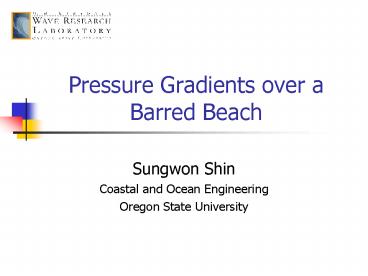Pressure Gradients over a Barred Beach
1 / 39
Title:
Pressure Gradients over a Barred Beach
Description:
Experimental Setup: Pressure Gages. Pressure gradient. onshore. PG 1 2 ... Wave gage : ADV : Pressure. transducer (Unit: cm) Cartwheel. Traverse line. Analysis ... –
Number of Views:57
Avg rating:3.0/5.0
Title: Pressure Gradients over a Barred Beach
1
Pressure Gradients over a Barred Beach
- Sungwon Shin
- Coastal and Ocean Engineering
- Oregon State University
2
Offshore sandbar movement
(Hoefel and Elgar, 2003)
3
Onshore sandbar movement
(Hoefel and Elgar, 2003)
4
Elgar et al (2001)
Sandbar location Maxima of S(u), A(u),
S(du/dt)
(Elgar et al, 2001)
5
Drake and Calantoni (2001)
- Large acceleration generates pressure gradient
6
Motivation
- Onshore bar migration has still difficulty in
simulation - Most of studies are focused on the quantities of
entire time series (all waves) - How about individual wave?
7
Objectives
- Lab experiment over a barred beach
- Synoptic data set for free surface, pressure, and
velocity - The relationship between pressure gradient and
acceleration in terms of skewness for both all
waves and individual wave
8
Measurement Location
Breaking
9
Experimental Setup Pressure Gages
- Pressure gradient
3 cm
1 cm
gt 0 , Onshore
PG 1 2 3 4
onshore
lt 0 , Offshore
10
Experimental Setup
11
Analysis
- Filtering
- High and low frequency components were removed
- Pressure gradient using 4 sensors
- Despike ADV signal (Goring and Nikora, 2002)
12
Time series of analyzed data over the bar
u (cm/s)
du/dt (cm/s2)
13
? ? , o p , ? u500 , ? u507
? S(dp/dx) , ? S(du/dt) , ? A(u500)
? S(dp/dx) , ? S(du/dt) , ? A(u507)
- Cross-shore variation of A(u), S(du/dt),
S(dp/dx) have good correlation for entire waves
14
- How about individual wave?
15
- Lets see skewness and asymmetry of free surface,
pressure, and velocity first
.
Good or not?
16
S(p) vs S(?)
? H1/3 o others
17
S(p) vs S(u)
? H1/3 o others
18
A(p) vs A(?)
? H1/3 o others
19
A(p) vs A(u)
? H1/3 o others
20
Joint distribution of ?, P and u
- Good news
- High correlation for individual waves in both
skewness and asymmetry - Water surface elevation and near bottom velocity
has some difference in skewness - Better correlation with 1/3 highest waves
21
dp/dx vs acceleration and velocity
22
A(u) vs S(du/dt)
- Not good
- Low correlation
? H1/3 o others
23
Cross-shore variation of r2 value
? H1/3 o All
24
S(dp/dx) vs S(du/dt)
Really bad
? H1/3 o others
25
Cross-shore variation of r2 value
? H1/3 o All
26
Time domain sediment transport model
- Rakha et al (1997), Karambas and Koutitas (2002)
phase-resolving Boussinesq model, time-averaged - Long and Kirby (2003) Boussinesq model with
instantaneous wave condition
27
Conclusion 1
Wait !!!!
- Acceleration skewness is used for modeling
sediment transport rate - However, acceleration skewness doesnt match with
pressure gradient skewness for individual wave
28
Exceedance Probability
29
Madsen (1974)
- Large horizontal pressure gradient can make bed
material lose its stability, i.e. momentary
failure. - ?Pcrit 0.5
? density of fluid ?t the density of the
saturated bed material F the angle of internal
friction
30
Cox et al (1991)
Onshore
Offshore
31
Exceedance probability
Rayleigh Distribution
Critical of ?P for sand stability is
0.5. (Madsen, 1974)
32
Exceedance probabilityOnshore
L 3
L 1
L 2
L 4
L 5
L 6
L 7
L 8
L 9
33
Exceedance probabilityOffshore
L 3
L 1
L 2
L 4
L 5
L 6
L 7
L 8
L 9
34
(No Transcript)
35
(No Transcript)
36
Discussion
- S(du/dt), S(dp/dx), A(u)
- Highly correlated for whole time series
- Low correlation for individual wave
- Should be considered to model with instantaneous
acceleration - Exceedance probability
- Offshore direction is dominant in this exp.
- Some extreme cases were found
37
(No Transcript)
38
(No Transcript)
39
Madsen (1974)
- Large inertia force combined with the loss of
stability of the bed result in significant
onshore sediment transport. - ?Pcrit 0.5































